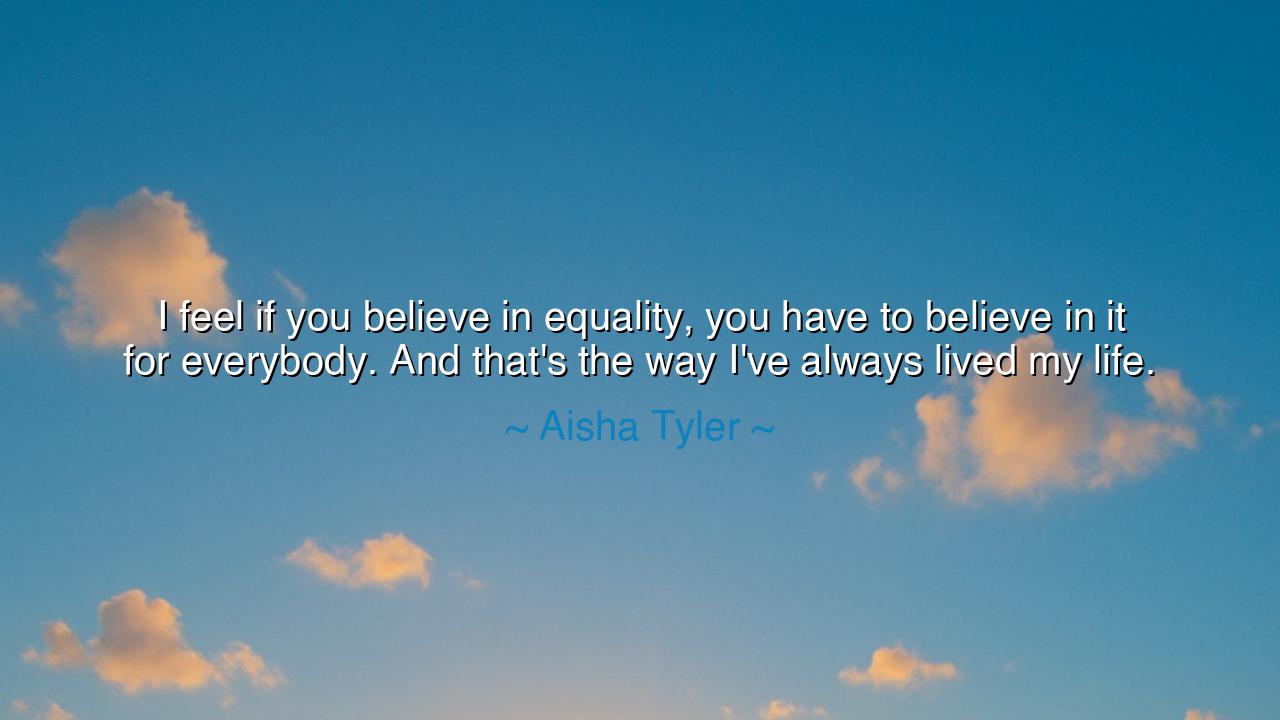
I feel if you believe in equality, you have to believe in it for
I feel if you believe in equality, you have to believe in it for everybody. And that's the way I've always lived my life.






In the eloquent and steadfast voice of Aisha Tyler, a woman of grace, intellect, and conviction, there emerges a truth as radiant as the dawn: “I feel if you believe in equality, you have to believe in it for everybody. And that's the way I've always lived my life.” Her words, though gentle in tone, resound with the power of moral clarity. They are not the musings of comfort, but the creed of courage. For to believe in equality for all—not merely for those who resemble us, not only for those whose struggles we understand—is to walk the narrow, sacred path of integrity. It is to love justice not as a banner for one’s own cause, but as a principle universal and unyielding.
The meaning of this quote lies in its uncompromising simplicity. Tyler reminds us that true belief in equality cannot be selective, conditional, or convenient. It is not a garment we wear when the weather of public opinion is fair, only to cast aside when storms of controversy arrive. Equality, if it is to mean anything, must encompass all souls—of every color, creed, gender, and love. It must reach the forgotten as much as the famous, the stranger as much as the friend. Anything less is not equality but preference disguised as virtue. Thus, Tyler’s declaration stands as a mirror, reflecting not only her own life of principle but also our own measure of sincerity.
The origin of this truth reaches back through the corridors of civilization. From the time when tribes first learned to divide themselves by difference, humanity has wrestled with the question of inclusion. History is heavy with those who claimed to love justice but only for their kin, who spoke of liberty but denied it to their neighbors. Aisha Tyler’s words rise as an antidote to such hypocrisy. They call to mind the teaching of the philosopher Aristotle, who said that virtue lies in constancy—that one must hold to principle even when it is costly. In Tyler’s belief, we hear the echo of that wisdom: to honor equality not as convenience, but as conviction.
Consider the story of Nelson Mandela, who endured twenty-seven years of imprisonment under apartheid. When the walls of his cell finally opened, he did not seek vengeance, but reconciliation. He believed in equality not only for his own people but also for those who had oppressed them. His greatness was not in victory, but in his refusal to exclude. Like Tyler, Mandela lived the understanding that justice divided by bitterness ceases to be justice at all. Through his forgiveness, he taught the world that equality must be inclusive to be eternal.
Tyler’s words also challenge the complacent heart. Many declare themselves lovers of equality until it demands empathy beyond their comfort. To believe in equality “for everybody” is to stand beside those who are different, those who frighten us, those whom society scorns. It is to refuse the easy escape of silence when others suffer. It is to recognize that one’s own liberation is bound up in the liberation of others. The ancients would have called this the path of virtue through empathy—a strength not of body, but of spirit. For compassion that excludes is not compassion, and justice that divides is not justice.
Her statement also carries the weight of personal responsibility. When Aisha Tyler says, “That’s the way I’ve always lived my life,” she offers not merely a belief but an example. She reminds us that equality is not a philosophy written in books—it is a daily practice. It is how one speaks, how one listens, how one acts. In a world filled with judgment and division, the quiet courage of treating every person with dignity becomes an act of defiance, a rebellion against indifference. Her life, both in her art and her advocacy, becomes a testament to living truth rather than merely proclaiming it.
Therefore, O listener and seeker of wisdom, take this lesson into your heart: If you claim to believe in equality, then believe in it fully—without exception, without hesitation. Do not let your empathy be partial or your justice be selective. Look upon every human being as bearer of the same light that dwells within you. Speak for those who cannot, defend those who are despised, and remember that your own humanity is measured by how you honor the humanity of others.
And so, let the words of Aisha Tyler be not only admired, but embodied. Let them remind us that the measure of belief is not in speech but in action. For the world does not need more voices that proclaim equality—it needs hearts that practice it. When we extend that belief to all—without boundary or bias—we become part of something divine: a society where no one stands above another, and where love, justice, and respect form the unbreakable circle of true humanity.






AAdministratorAdministrator
Welcome, honored guests. Please leave a comment, we will respond soon